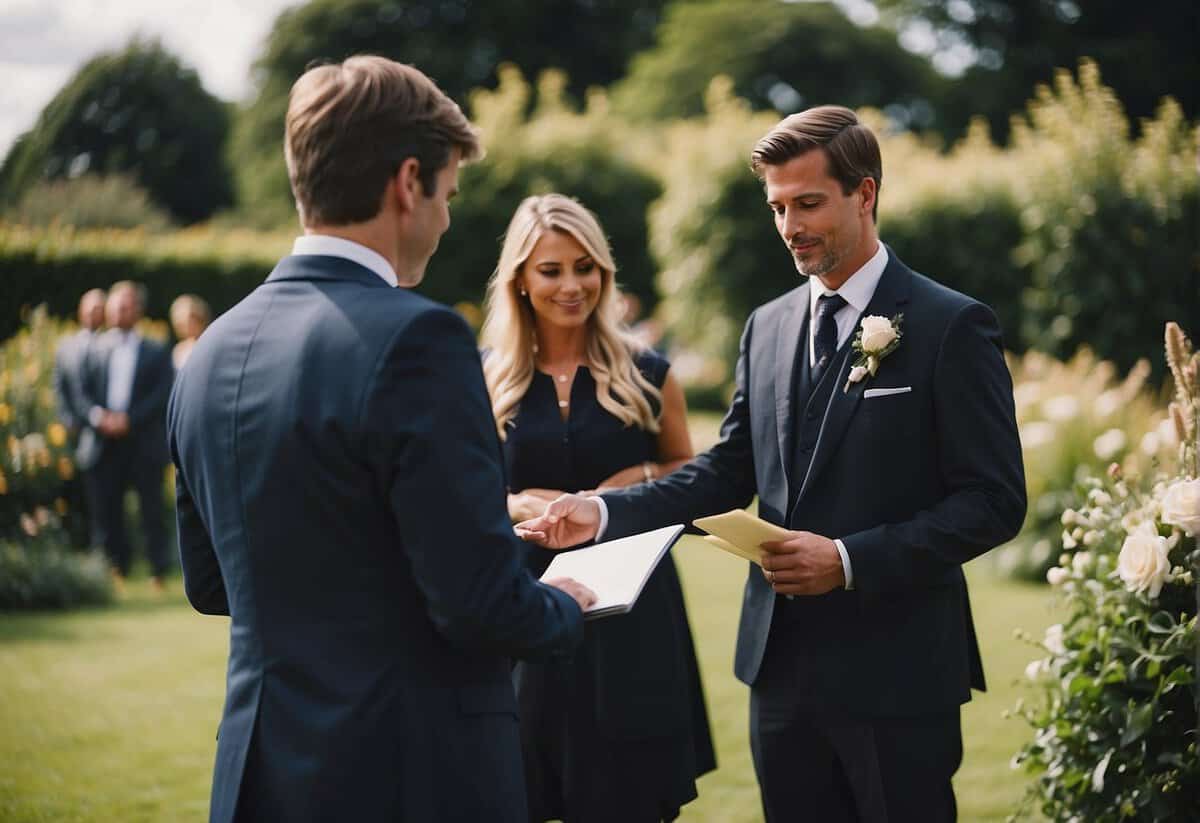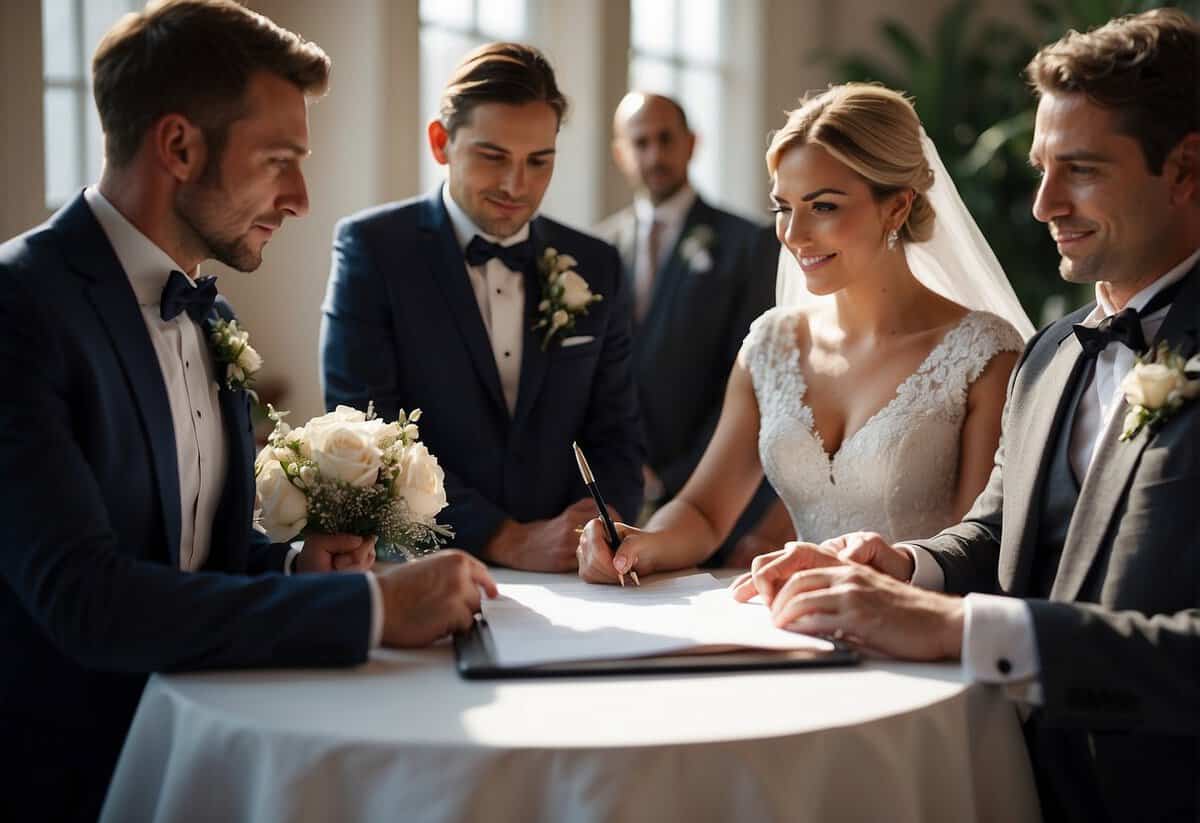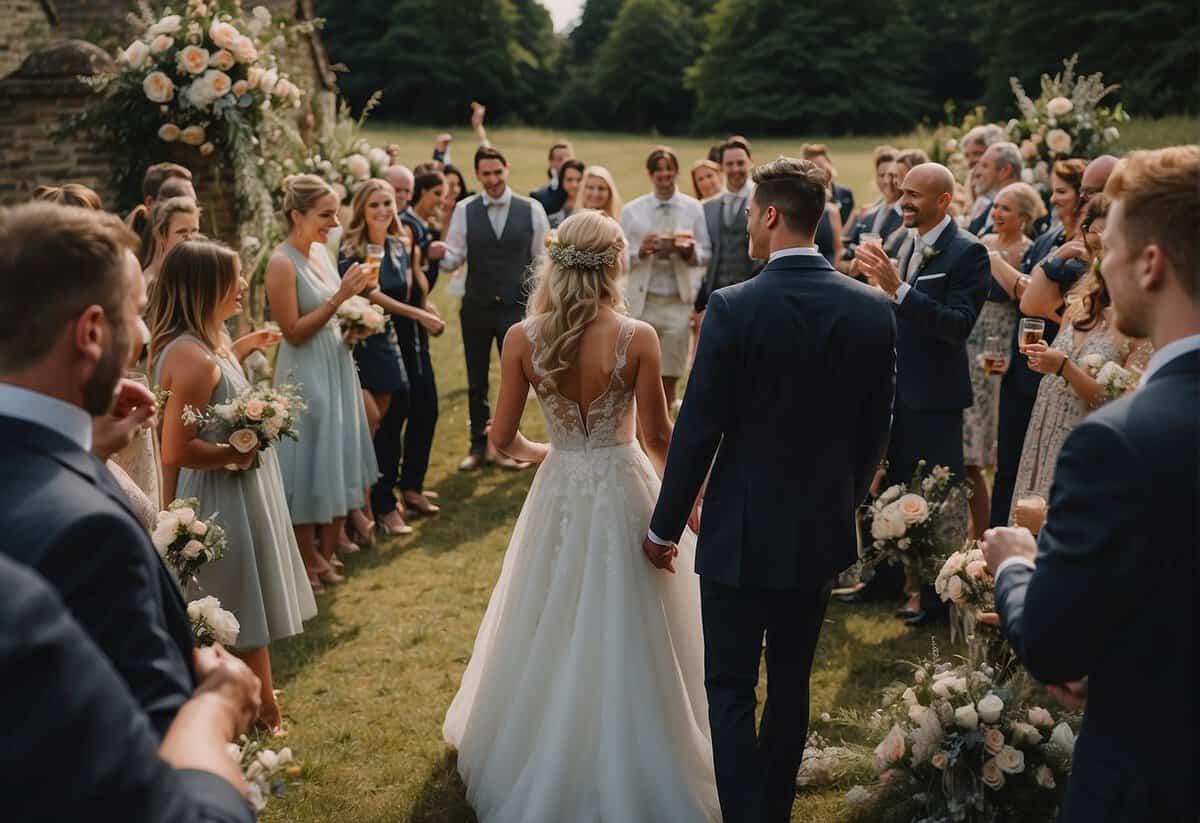Can a Friend Marry You in the UK? Understanding the Legality of Friend-Officiated Weddings
In the UK, the idea of a friend officiating your wedding might seem like a charming personalized touch to your special day. Traditionally, weddings have been presided over by religious officials or registrars, but it’s natural to wonder if the rules have space for a more personal approach. It is important to note that for a ceremony to be legally binding in the UK, it must be performed by a person or in a place that’s recognized by the law. Whether you desire a civil ceremony or a religious one, understanding who is authorized to conduct your marriage will ensure your big day goes without a hitch.

If you’re considering having a friend lead your ceremony, it’s crucial to understand the legal requirements that make a marriage official. While personalization is always encouraged to make your wedding memorable, the legal aspect of the marriage cannot be overlooked. The key is to balance the ceremony of your dreams with the legal obligations, which include the necessity for certain words to be spoken, and for the marriage to be conducted in a venue that is approved for the purpose of marriage.
Key Takeaways
- A legally binding wedding in the UK requires an authorized person or venue.
- Civil and religious ceremonies have specific legal regulations that must be followed.
- Personal touches to the ceremony are permitted, but the legal framework must be adhered to for the marriage to be recognized.
Legal Requirements for Marrying in the UK

When you’re planning to get married in the UK, you must comply with specific legal regulations. It’s essential that you’re eligible to marry, have the correct documents, and adhere to the required notice period.
Eligibility and Documents
To enter into a marriage or a civil partnership in the UK, you and your partner must both be at least 16 years old. However, if you’re under 18 years old, you’ll need consent from parents or guardians. You must be single, widowed, or divorced – being previously married or in a civil partnership constitutes a lawful impediment to marrying again.
Before you can marry, both you and your partner must provide:
- Proof of name, age (birth certificate), and address
- Proof of nationality: Either a passport or a national identity card
- If previously married, a decree absolute or former partner’s death certificate
Notice Period and Marriage Notice
You must give at least 29 days’ notice at your local register office that you’re engaged and intend to get married. This is known as “giving notice”. When you give notice, you’ll declare that there is no lawful impediment to your marriage.
You and your partner must provide the following to the register office or superintendent registrar:
- Details about your intended venue – this can be a register office, a religious building recognized for marriage, or other premises approved by local authorities
- Names of your proposed witnesses (you will need two)
After giving notice, a marriage schedule will be issued by the registrars, which is valid for one year. It is important to plan your marriage ceremony within this period, or you will need to go through the notice process again.
Types of Wedding Ceremonies in the UK

In the UK, you can choose between a civil or religious wedding ceremony, with each type having its own distinct requirements and customs.
Civil Weddings and Civil Partnerships
A civil wedding is a non-religious ceremony conducted by a registrar, which can take place at a register office or any approved venue. You and your partner must give notice at least 28 days in advance. For civil partnerships, which are available to both opposite-sex and same-sex couples, a schedule must be signed in the presence of a registrar and two witnesses, with or without a ceremony.
Religious and Church Weddings
Religious wedding ceremonies vary depending on the faith. For a Church of England or Church in Wales wedding, you usually speak with your local vicar, and if you wish to marry in your parish church, you won’t typically need to be resident or regularly worship there. A Catholic wedding will involve a priest and usually requires several months of preparation. Other faiths such as Jewish and Quaker communities have their own customs; however, all ceremonies must take place in a registered religious building for the marriage to be legally recognized.
Alternative Ceremony Options
For a more personalized touch, alternative ceremonies such as humanist weddings are conducted by a humanist celebrant and reflect the couple’s beliefs and values. These ceremonies are not legally binding in some parts of the UK, meaning you may need to have a civil ceremony as well. Non-legally binding ceremonies give you the freedom to have your friend conduct the ceremony if they’re ordained online, although this doesn’t legally marry you without a civil ceremony.
Venues and Officials for Wedding Ceremonies

In the UK, your wedding venue and the officiant presiding over your ceremony are essential elements that shape your big day. Whether you opt for a grand stately home or a more intimate setting like your residence, understanding who can officiate your ceremony and where it can legally take place is key.
Approved Venues and Officiants
England and Wales: You can hold your wedding at an approved venue such as hotels, stately homes, or even a castle. These venues need to have a licence to host wedding ceremonies. In terms of officiants, a priest can officiate at a religious building like a church or a synagogue. If you prefer a civil ceremony, a registrar must conduct the ceremony, commonly at a registry office or at an licensed venue of your choice.
Scotland: Scotland offers more flexibility; you can marry at any location as long as it’s agreed upon by your officiant. It could even be outdoors or in your own home. However, your chosen officiant must be approved by the registrar general.
Northern Ireland: Here, you have the option to have a religious or civil ceremony. Similar to England and Wales, any venue must have the appropriate licence, and a recognised officiant, such as a priest, registrar, or a member of the Society of Friends, must conduct the ceremony.
For Military Personnel: Special provisions can be made for military personnel, where a ceremony can take place at a military chapel or a licensed military establishment.
Special Considerations for Specific Venues
Religious Ceremonies: For a religious ceremony at a place like the Church of England or Church in Wales, the location has to be a registered religious building, and the officiant will usually be a church official, like a priest.
Civil Ceremonies: In civil weddings, while your friend or family member cannot legally officiate, they can take part in your special day by performing certain aspects of the ceremony at a location licensed for civil marriages.
Fee Structure: Keep in mind that each venue and officiant may charge a fee, which can vary widely depending on where you are in the UK and the stature of the venue. Usually, booking the venue includes a fee for the officiant, but this is something you will want to confirm as you make your arrangements.
Post-Wedding Legalities

After celebrating your marriage, it’s crucial to ensure that your union is legally recognized. You’ll need to complete a few formalities to make your marriage legally binding and properly registered.
Registering the Marriage
Once the ceremony is over, you have an important task: registering your marriage. This is done at your local register office. It’s a straightforward process where the marriage is recorded in the marriage register, making it legally recognized.
Visit the Local Register Office: You or your spouse must go to the register office in the district where your marriage took place.
Marriage Certificate: You should receive a marriage certificate as proof of your registered marriage. This document is essential for legal matters, such as opening a joint bank account or if you plan to change your name.
Deadline: Ensure you register the marriage within the stipulated time frame set by the local authority to avoid any unnecessary complications.
Remember, failure to register your marriage means it won’t be legally recognized, which could have significant implications for your rights as a couple.
Frequently Asked Questions

Navigating the specifics of having a friend officiate your wedding in the UK can be a tricky process. The following FAQs shed light on important aspects of involving a friend in your marriage ceremony.
How can a friend become certified to officiate a wedding in the UK?
Unfortunately, in the UK, your friend cannot become legally certified to officiate a wedding unless they are either a registered member of the clergy or a registrar. However, they can conduct a non-legally binding ceremony.
Are there legal requirements for a person to officiate a wedding in the UK?
Yes, legal requirements must be adhered to for a person to officiate a wedding in the UK, including being authorized by the Registrar General.
What is the process for a celebrant to legally marry a couple in the UK?
A celebrant in the UK can conduct the ceremony, but for the marriage to be legal, the couple must also have a civil ceremony at a registry office.
Is it possible to have a legally binding marriage in the UK without a traditional wedding?
Yes, you can have a legally binding marriage without a traditional wedding by having a civil ceremony at a register office or approved venue.
What are the specific laws governing who can officiate a marriage in the UK?
The UK has specific laws that state a wedding must be carried out by a person or in the presence of a person authorized to register marriages in the district where the ceremony takes place.
Can a marriage ceremony performed by a friend hold legal status in the UK?
A marriage ceremony performed by a friend can only hold legal status if it is followed by a civil ceremony that fulfills all legal requirements.

